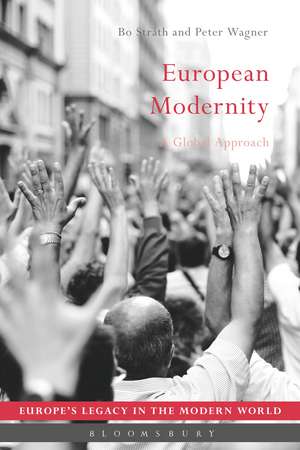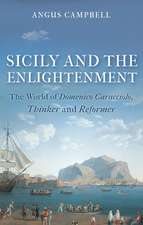European Modernity: A Global Approach: Europe’s Legacy in the Modern World
Autor Bo Stråth, Prof. Peter Wagneren Limba Engleză Paperback – 26 iul 2017
| Toate formatele și edițiile | Preț | Express |
|---|---|---|
| Paperback (1) | 178.22 lei 3-5 săpt. | |
| Bloomsbury Publishing – 26 iul 2017 | 178.22 lei 3-5 săpt. | |
| Hardback (1) | 540.31 lei 6-8 săpt. | |
| Bloomsbury Publishing – 26 iul 2017 | 540.31 lei 6-8 săpt. |
Preț: 178.22 lei
Preț vechi: 232.19 lei
-23% Nou
Puncte Express: 267
Preț estimativ în valută:
34.10€ • 35.73$ • 28.26£
34.10€ • 35.73$ • 28.26£
Carte disponibilă
Livrare economică 18 martie-01 aprilie
Preluare comenzi: 021 569.72.76
Specificații
ISBN-13: 9781350007062
ISBN-10: 1350007064
Pagini: 264
Dimensiuni: 156 x 234 mm
Greutate: 0.32 kg
Editura: Bloomsbury Publishing
Colecția Bloomsbury Academic
Seria Europe’s Legacy in the Modern World
Locul publicării:London, United Kingdom
ISBN-10: 1350007064
Pagini: 264
Dimensiuni: 156 x 234 mm
Greutate: 0.32 kg
Editura: Bloomsbury Publishing
Colecția Bloomsbury Academic
Seria Europe’s Legacy in the Modern World
Locul publicării:London, United Kingdom
Caracteristici
Draws on historical and sociological perspective to relate the question to issues in contemporary Europe
Notă biografică
Bo Stråth is Emeritus Professor of Nordic, European and World History at the University of Helsinki, Finland. He also taught contemporary history at the European University Institute in Florence, Italy.Peter Wagner is Research Professor at the Catalan Institute for Advanced Studies and Research (ICREA) at the University of Barcelona, Spain.
Cuprins
Part I. The Question of European Modernity1. Introduction: Modernity - Europe - European Modernity2. What is Europe?Part II. Key Features of European Modernity Reconsidered3. Europe's Hesitation with Democracy4. The Industrial and Market Revolution in Global Perspective: The Colonial Heritage and theSocial Question5. European Religion: The Christians and the Others6. The European: Atom - Individual - Person - Subject?PART III Transformations of European Modernity7. The Axial Age and Modern Europe8. The Great Transformation: Organized Modernity for Welfare and Warfare, 1870s - 1960s9. The New Great Transformation: The Global Challenge of Historical injustice and Movementsfor Collective Self-determination: 1960s - The presentEpilogueBibliographyIndex
Recenzii
[The] authors do not resort to jargon, and though the authors' different writing styles manifest themselves in the work, the ideas of the whole are retained. Excellent text for historiography. Good endnotes; no separate bibliography; good index.
A highly important work operating right at the intersection of two major intellectual challenges of our time period. The authors help us to further decenter our conceptions of modernity while at the same time putting facets of European history newly into global historical contexts.
In this fluidly written and rigorously argued book, Strath and Wagner challenge the idea of 'modernity' that began in Europe and then spread elsewhere. In doing so, they offer important insights into the role of markets, trade, colonialism, and globalization in the making of the modern world. The book 'provincializes' both Europe and north America, the latter being the most important twentieth century legatee and champion of European style modernization and modernity. Far reaching in its historical and philosophical implications, this book is a landmark in scholarly analyses that seek to de-center Europe.
'What is Europe?' ask Bo Strath and Peter Wagner in this elegant and finely-argued book. For a stubborn many, Europe is the birthplace of modernity, the avant-garde that anyone and any place wishing to be considered modern must follow. Strath and Wagner challenge this European self-praise. Working in English, French, German and Spanish, and drawing on their expertise in History, Sociology and Philosophy, Strath and Wagner not only provincialize Europe but do so in ways that respect the historical specificity of Europe. That is, they pay attention to the relative uniqueness of processes both internal and external to Europe, both good and bad, both ambiguous and contradictory. It remains to be seen how many of those who insist on the discredited idea of Europe as the sole parent of modernity will be moved by this excellent book to reconsider their prejudices. But, whatever they do, they cannot ignore the sophisticated argument offered here.
The volume bundles extensive knowledge, especially of recent historiography, which sets itself apart from a Eurocentric perspective, and thus represents a good introduction to current research and its debates.
A highly important work operating right at the intersection of two major intellectual challenges of our time period. The authors help us to further decenter our conceptions of modernity while at the same time putting facets of European history newly into global historical contexts.
In this fluidly written and rigorously argued book, Strath and Wagner challenge the idea of 'modernity' that began in Europe and then spread elsewhere. In doing so, they offer important insights into the role of markets, trade, colonialism, and globalization in the making of the modern world. The book 'provincializes' both Europe and north America, the latter being the most important twentieth century legatee and champion of European style modernization and modernity. Far reaching in its historical and philosophical implications, this book is a landmark in scholarly analyses that seek to de-center Europe.
'What is Europe?' ask Bo Strath and Peter Wagner in this elegant and finely-argued book. For a stubborn many, Europe is the birthplace of modernity, the avant-garde that anyone and any place wishing to be considered modern must follow. Strath and Wagner challenge this European self-praise. Working in English, French, German and Spanish, and drawing on their expertise in History, Sociology and Philosophy, Strath and Wagner not only provincialize Europe but do so in ways that respect the historical specificity of Europe. That is, they pay attention to the relative uniqueness of processes both internal and external to Europe, both good and bad, both ambiguous and contradictory. It remains to be seen how many of those who insist on the discredited idea of Europe as the sole parent of modernity will be moved by this excellent book to reconsider their prejudices. But, whatever they do, they cannot ignore the sophisticated argument offered here.
The volume bundles extensive knowledge, especially of recent historiography, which sets itself apart from a Eurocentric perspective, and thus represents a good introduction to current research and its debates.
















